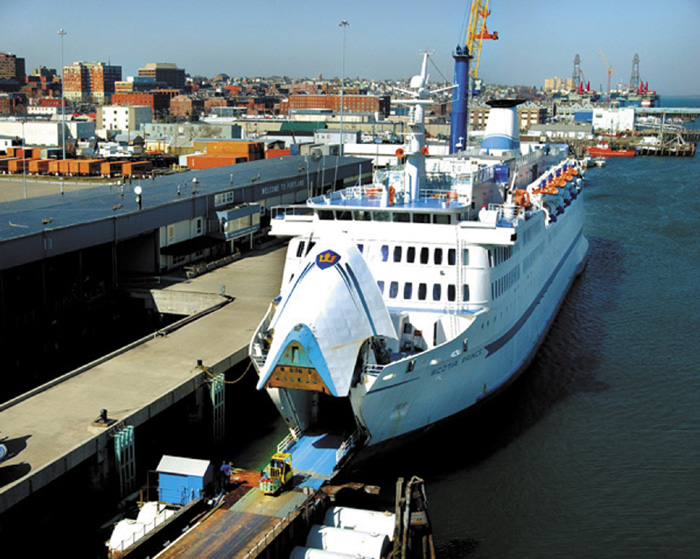Nova Scotia has rejected both proposals it received for operating a ferry service between Yarmouth, Nova Scotia, and Portland, ending any possibility of service this year.
The province will continue to look for an operator that can start ferry service in 2014, according to a statement issued Tuesday by Percy Paris, Nova Scotia’s minister of economic and rural development and tourism.
“We know this is disappointing news and I share in this disappointment. However, we are not giving up on a new ferry in Yarmouth,” Paris said. “People in southwestern Nova Scotia want to see a viable ferry service in Yarmouth. So does this government. Nova Scotians living in this region deserve the right service, one they can count on being there for the long term.”
Last fall, the province asked for ferry proposals, having decided to commit as much as $21 million over seven years to subsidize a service.
One bidder, Quest Navigation Inc. of Eliot, said it could start as early as this summer. Maritime Applied Physics Corp. of Baltimore also submitted a proposal.
An evaluation committee found that neither proposal met the “minimum criteria,” Paris said.
Mark Amundsen, president and CEO of Quest Navigation Inc. said in a statement the company remains confident that its plan is the best option and that his company will meet with Nova Scotia officials and determine the next step.
No ferry service has operated between Nova Scotia and the United States since 2009, when a high-speed ferry run by Bay Ferries Ltd. ended its operation after the Nova Scotia government decided to stop subsidizing it.
John Henshaw, executive director of the Maine Port Authority, said an official in Nova Scotia’s government told him about the decision Tuesday and said the government plans to take a more “proactive” approach to finding a ferry operator.
Instead of issuing a request for bids and seeing who responds, officials plan to approach ferry companies directly and ask them to considering operating the service, Henshaw said.
Maine has not committed to spending any money on the service.
Revising the ferry is an ambitious task that needs to involve political leaders in both Nova Scotia and Maine to be successful, said Jeff Monroe, a former Portland official who worked as a consultant for a ferry company that did not submit a bid.
“You need (Nova Scotia) Premier Darrell Dexter and Gov. LePage working together to show that both of our areas are working to make sure this transportation link happens,” he said.
That kind of collaborative approach is lacking, Monroe said.
But Henshaw, of the Maine Port Authority, said the lack of involvement by Maine officials is not the problem.
“In my mind, the problem is the business case,” he said. “This thing has to establish enough revenue to operate. Other than throwing money at the problem, there is a limit to what government can do.”
Nova Scotia’s plan to talk directly to ferry companies about the service is a “good place to start,” he said.
A study last summer by the Nova Scotia government determined that a ferry service in the Gulf of Maine can succeed only if the business model is built around the passengers’ on-board experience rather than simply offering another transportation route from the United States to Nova Scotia.
The best example of such a ferry, the study noted, was the Scotia Prince, which operated from 1982 to 2004. The service canceled the 2005 season in part over a dispute with the city of Portland over the condition of the city’s passenger terminal, which has since been demolished. It was replaced by the $21 million Ocean Gateway terminal.
The Cat, a high-speed catamaran took over the Portland-Yarmouth route in 2005. The Cat ended its service after the 2009 season, after carrying about 75,000 passengers, less than half of the number of passengers who traveled across the Gulf of Maine in 2002 on the Scotia Prince and the Cat, which at the time traveled between Bar Harbor and Yarmouth.
According to a Nova Scotia study completed last August by a panel of tourism, ferry and business experts, a number of factors have led to the decline of Nova Scotia as a tourism destination for Americans. They include the appreciating Canadian dollar, higher fuel prices, confusion over U.S. passport requirements and the weakened state of the U.S. economy since 2007.
In addition, the study noted, Nova Scotia is facing growing global competition, such as cheap airfares, exotic destinations and the mass-market cruise vacation. The report’d authors said Nova Scotians have a lot of work to do if they want to lure back Americans.
“It will take more than a ferry across the Gulf of Maine to bring back the visitors whose departure over the past decade is the reason there is no ferry service today,” the report said.
Tom Bell can be contacted at 791-6369 or at:
tbell@pressherald.com
Send questions/comments to the editors.


